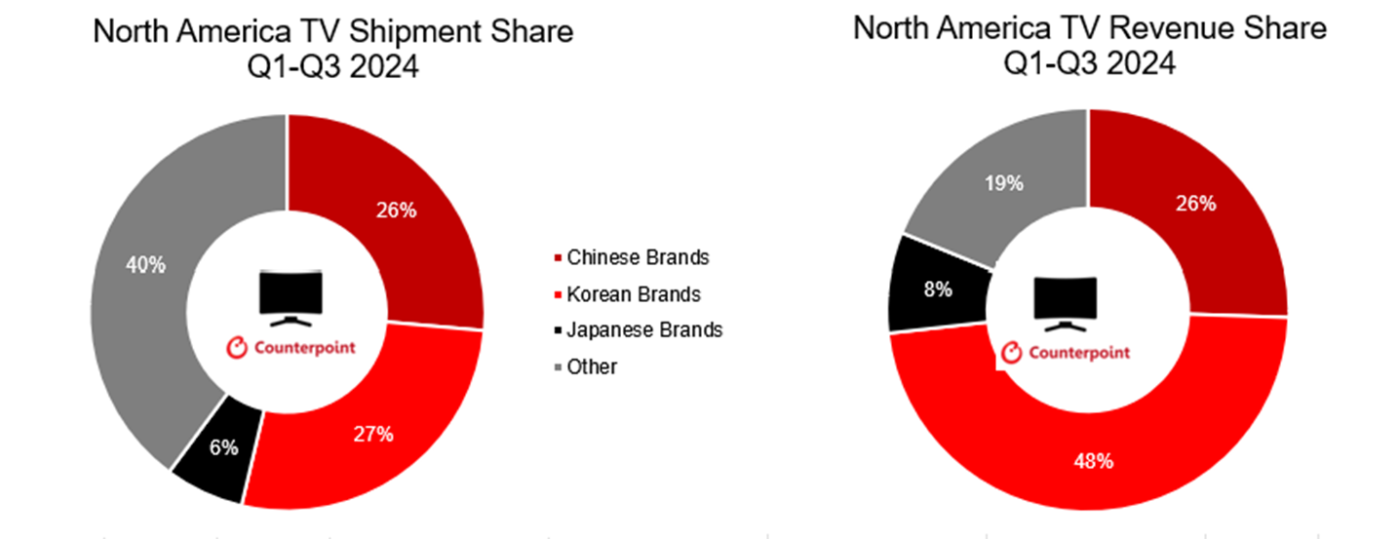トランプ関税爆弾が米国FPD製品を直撃の可能性
これらCounterpoint Research FPD部門 (旧DSCC) 発の分析記事をいち早く無料配信するメールマガジンにぜひご登録ください。ご登録者様ならではの優先特典もご用意しています。【簡単ご登録は こちらから 】
記事のポイント
- 米国のスマートフォン、モバイルPC、モニターの約80%が中国からの輸入である
- 米国のTV輸入の約80%はメキシコからである
- 米国の関税戦争に対抗し中国が補助金支払いの可能性、中国ブランド支援のため
- 韓国企業は米関税・中国補助金戦争の最前線に立たされることを懸念している
トランプ大統領はメキシコに対する25%関税の発動を延期したが、中国からの輸入品に対する10%関税は発効しており、メキシコに対する関税も1ヵ月以内に実施の可能性がある。トランプ政権の「関税爆弾」が現実のものとなれば、スマートフォン、ノートPC、タブレット、モニター、TVの価格上昇は避けられないだろう。グローバル市場調査会社 Counterpoint Researchが米国際貿易委員会 (ITC) のデータを分析したところによると、米国トランプ政権の関税爆弾政策が現実のものとなった場合、米国に輸入されるFPD関連の完成品の80%が関税の影響を受けると予測される。また、中国からの直接輸入よりもメキシコ経由の輸入が大きな割合を占めるTVの場合、中国だけでなく韓国もメキシコの25%関税の悪影響を避けることは難しいだろう。
Counterpoint Researchは、「メキシコに関税が課された場合、北米でのプレミアムTV販売の割合が高い韓国ブランドは、中国ブランドよりも関税の悪影響が大きく受けることになるだろう」と述べている。Counterpoint Researchの Global TV Shipments Quarterly Tracker によると、2024年第1-3四半期の北米TV出荷額に占める累積シェアは、韓国ブランドが48%、中国ブランドが27%だった。中国企業も韓国企業も、関税爆弾の悪影響を避けることは難しいだろう。
同期間中の出荷数ベースの累積シェアは、中国ブランドが28%、韓国ブランドが27%とほぼ同じ水準だったが、金額ベースの市場シェアは韓国が48%、中国が27%となっている。Samsung ElectronicsとLG Electronicsは北米市場で信頼のおけるプレミアムブランドとしての地位を確立しており、現地市場で高画質で大型のプレミアム製品を中心に販売する戦略が影響している。TCLとHisenseは米国プレミアム市場をターゲットにしているが低価格重視のため、金額シェアは韓国ブランドほど大きくない。
各国ブランドには以下の企業が含まれ、その他のブランドはOthersに含まれる。
中国ブランド:Haier、Hisense、Skyworth、TCL、Toshiba
韓国ブランド:Samsung、LG
日本ブランド:Funai、Sharp、Sony
こうしたなか、中国政府は昨年下半期に総額1兆3000億元の特別長期国債の調達計画を発表しており、その一部が自動車や家電など耐久消費財の販売補償に充てられることが分かっている。中国政府が実際に販売補助金を支給することになれば、米国で関税引き上げが実施されても、中国のTVやスマートフォンの大手メーカーが現行水準の価格を維持するための基盤となり得る。そのため、こうした措置によって中国輸入品に対する無効化策の効果が弱まれば、米国政府が関税をさらに引き上げることも考えられ、国家間の関税戦争がさらに悪化する可能性がある。
大手TVメーカーは当初のメキシコ関税爆弾政策に対し、サプライチェーン多様化戦略で対応すると予想される。東南アジアに生産拠点を持たない中国のHisenseは欧州工場の活用で米国への輸出継続が可能だろうし、TCLは欧州と東南アジアの生産拠点を活用し米国への輸出を継続すると予想される。ベトナムもインドもTV製造を拡大しているが、メキシコで確立されたスケールメリットには両国とも及ばない。
メキシコの関税引き上げの影響を最小限に抑えるため、韓国企業は欧州や東南アジアでの米国供給向け生産の増加や、米国での直接生産といった代替案を検討している。Counterpoint ResearchのリサーチャーであるCalvin Leeは、「短期的には欧州や東南アジアの工場で生産を増やして対応するとしても、トランプが仕掛けた関税戦争によって世界のTV価格が上昇するのは避けられないようだ」と述べ、「トランプ政権の関税爆弾政策も交渉カードの1つになり得るため、目まぐるしく変わる政策変更を引き続き注視する必要がある」と提言している。
[原文] Trump's Tariff Bomb Can Be a 'Direct Hit' on US Display Products
• Approximately 80% of US Smartphones, Mobile PCs, and Monitors Are Imported from China
• Approximately 80% of US TV Imports are from Mexico
• Possibility of China 'Subsidy Payment' in Response to US 'Tariff War' to Help Chinese Brands
• Korean Companies Concerned about Being 'Front-End' by US Tariff-China Subsidy War
Although President Trump delayed implementation of 25% tariffs for Mexico, the 10% tariffs on goods from China has taken effect, and the Mexico tariffs may still happen in one month. If the Trump administration's 'tariff bomb' becomes a reality, it is expected that the prices of smartphones, laptops, tablets, monitors and TVs will inevitably increase. According to the analysis of data from the US International Trade Commission (ITC) by global market research firm Counterpoint Research, if the US Trump tariff bomb policy becomes a reality, 80% of all finished products related to displays imported into the US are expected to be affected by tariffs. In addition, in the case of TVs, which account for a larger portion of imports through Mexico than direct imports from China, not only China but also Korea would have difficulty avoiding the negative impact of Mexico's 25% tariff.
Counterpoint Research said, “If the tariffs are imposed on Mexico, Korean brands, which have a high proportion of premium TV sales in North America, will be more adversely affected by the tariffs than Chinese brands.” According to Counterpoint Research’s Global TV Tracker, the cumulative proportion of North American TV revenues in the first three quarters of 2024 was 48% for Korean brands and 27% for Chinese brands. It will be difficult for both Chinese and Korean companies to avoid the negative impact of the tariff bomb.
The cumulative market share based on shipments during the period was similar at 28% for Chinese brands and 27% for Korean brands, but the market share based on revenues was 48% for Korea and 27% for China. As Samsung Electronics and LG Electronics have established themselves in the North American market as trustworthy premium brands, their strategy of selling mainly high-definition and large-size premium products in the local market had an impact. TCL and Hisense are targeting the US premium market, but their revenue share is not as large as the Korean brands because they are focusing on low prices.
In this situation, the Chinese government announced a plan to procure a total of 1.3 trillion yuan in special long-term government bonds in the second half of last year, and it is known that some of this will be used as compensation for the sale of durable consumer goods such as automobiles and home appliances. If the Chinese government actually provides sales subsidies, this could serve as a basis for major manufacturers of Chinese TVs and smartphones to maintain their prices at the current level despite tariff increases in the United States. Therefore, if the effect of the Chinese import neutralization measures is weakened by such measures, it is possible that the tariff war between countries will worsen further, as the US government may further raise tariffs.
Major TV manufacturers are expected to respond to the initial Mexican tariff bomb policy with a supply chain diversification strategy. Chinese Hisense, which does not have a production base in Southeast Asia, could continue exporting to the US by utilizing its European factories, and TCL is expected to utilize its production bases in Europe and Southeast Asia to continue exporting to the US. Both Vietnam and India have been expanding TV manufacturing, but neither country could match the economies of scale established in Mexico.
In order to minimize the impact of Mexico's tariff hike, Korean companies are reviewing alternatives such as increasing production in Europe and Southeast Asia to supply to the US and direct production in the US. Counterpoint Research researcher Calvin Lee said, “Even if we respond by increasing production volumes at factories in Europe and Southeast Asia in the short term, it seems inevitable that global TV prices will rise due to the tariff war initiated by Trump,” and suggested, “The Trump administration’s tariff bomb policy could be another negotiation card, so we should continue to watch the rapidly changing policy changes.”

